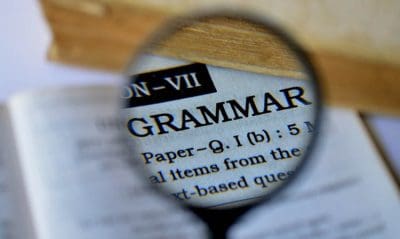
In English grammar, there are 8 different types of words:
Nouns
Pronouns
Adjectives
Verbs
Adverbs
Conjunctions
Prepositions
Interjections
The 8 types are called “parts of speech”. Each part of speech has a specific use and function within the language.
In this lesson you will learn the use and function of each part of speech:
What are nouns?
Nouns are words that name:
1) things: table, chair
2) people: Mark, Jane, pilot, singer, driver
3) animals: dog, cat
4) places: New York, England
5) concepts, ideas and emotions: hope, love, sadness
If you look around you, everything you see is a noun!
Examples:
Mark is driving a car.

The dog is in the garden.
Let’s go to London.
What are pronouns?
Pronouns are words that take the place of nouns. Pronouns replace nouns.
Sometimes, we do not want to use a noun or an actual noun is not appropriate. So we use a pronoun.
There are different types of pronouns as follows:
Personal pronouns
Personal pronouns take the place of nouns referring to people. If the person is the subject of the sentence, we use a personal subject pronoun.
Personal subject pronouns: I, you, he, she, it, we, they
Examples:
Mark is in the kitchen. He is cooking.
In the above example, Mark is a noun. In the second sentence, “he” is a personal subject pronoun that replaces the noun “Mark”. We choose to use a pronoun in order to avoid repetition.
If the person is the object of the sentence, we use a personal object pronoun.
Personal object pronouns: me, you, him, her, it, us, them
Example:
Mark does not like me.
Possessive pronouns
Possessive pronouns: mine, yours, his, hers, ours, theirs
Possessive pronouns indicate who owns something. Who possesses something? To whom does something belong?
Example:
Is that David’s car?
No, it is mine.
In the above example, the pronoun “mine” is the first person singular. It replaces the noun “car” and also indicates who owns the car.
What are adjectives?
Adjectives are words that describe nouns or pronouns. Adjectives give more details and more information about a noun or pronoun.
Adjectives can give us more information about a noun in the following ways:
The quality or type
Example:

Mark is driving a black car.
In the above example, “car” is a noun and “black” is an adjective describing the noun “car”. The adjective “black” gives us more information about the car by telling us the colour.
The size
Example:
Mark is driving a big car.
The number
Example:
Mark has several cars.
Possession and ownership
Possessive adjectives: my, your, his, her, its, our, their
Example:
It is his car.
What are verbs?
Verbs are words that show an action.
Examples:
Mark drives a bus.
Jane is drinking a cup of coffee.
We played football.
Verbs can also show a state. These types of verbs are often linking verbs. They give us more information about the subject of the sentence.
Examples:
Jane was angry.
I feel ill.
Mark is tired.
Verbs have different tenses which indicate:
time (past, present or future)
aspect (completed or continuous)
We can also categorise verbs as transitive or intransitive. A transitive verb has a direct object but an intransitive verb does not.
What are adverbs?
Adverbs are words that describe or modify verbs
Examples:
Mark is running quickly. (adverb of manner)
Jane never drinks coffee. (adverb of frequency)
We will go there tomorrow. (adverb of place)
Adverbs can also describe or modify other adverbs
Example:
Mark is running quickly. > Mark is running very quickly.
Adverbs can also describe or modify adjectives
Examples:
Mark is tired. > Mark is very tired.
The car is expensive. > The car is too expensive.
What are conjunctions?
Conjunctions join words, phrases, or clauses together.
Common examples of conjunctions: and, or, because, so, but, while, for.
Examples:
The telephone rang while I was cooking dinner.
I like cats and dogs.
I am hungry but I don’t have any food.
What are prepositions?
Prepositions connect noun phrases to another part of the sentence.
Preposition means “place before”. It is usually before the noun phrase.
There are different types of preposition in English:
Prepositions of place
Prepositions of place describe where something is.
in, on, at, under, over
Examples:
Mark is in the kitchen.
The lamp is on the table.
Prepositions of time
in, on, at, during, for
Prepositions of time describe time and when something happens.
Examples:
Please don’t talk during the lesson.
I am going to London for a week.
I go to the cinema on Saturdays.
Prepositions to describe method
in, by
Examples:
I will send you the offer by email.
He gave me an answer in writing.
What are interjections?
Interjections are small words without any real grammatical value.
Interjections express emotion. They are common in spoken English.
Examples:
Brrr! It’s cold in here.
(to express feeling cold.)
Damn! I missed the train.
(to express disappointment or frustration)
Hurray! I won the lottery.
(to express feeling pleased.)
Shh! Please don’t talk during the film.
(to ask people to be quiet.)
Related lessons
Personal pronouns in English
Countable and uncountable nouns | English grammar
Plural forms of English nouns
FOR and DURING – English prepositions
The prepositions FOR and SINCE
Prepositions of time “by” and “until”
IELTS online course and writing corrections


radhasri says
In the beginning, I would like to thank you much about this great post. Its very useful and helpful for anyone looking for tips to help him learn and master English. I like your writing style and I hope to keep this good working. I hope to find more resources here to help me improve my English skills for free. Thanks once again for your efforts regarding this topic and I hope to read more topics like this. Have fun and keep good working.
J. Peo says
what part of speech is the word “sad” and the word “joy?”
Ahmad says
“sad” is an adjective
“joy” is a noun
Anil saharan says
Sir ” please” and “pleasure”me konsa parts of speech h.
Tell me
Please me konsa parts of speech h.
Or abstract noun me please ka pleasure hota h Kya h
Diyau says
MiniMize mai kon sa part of speech hai